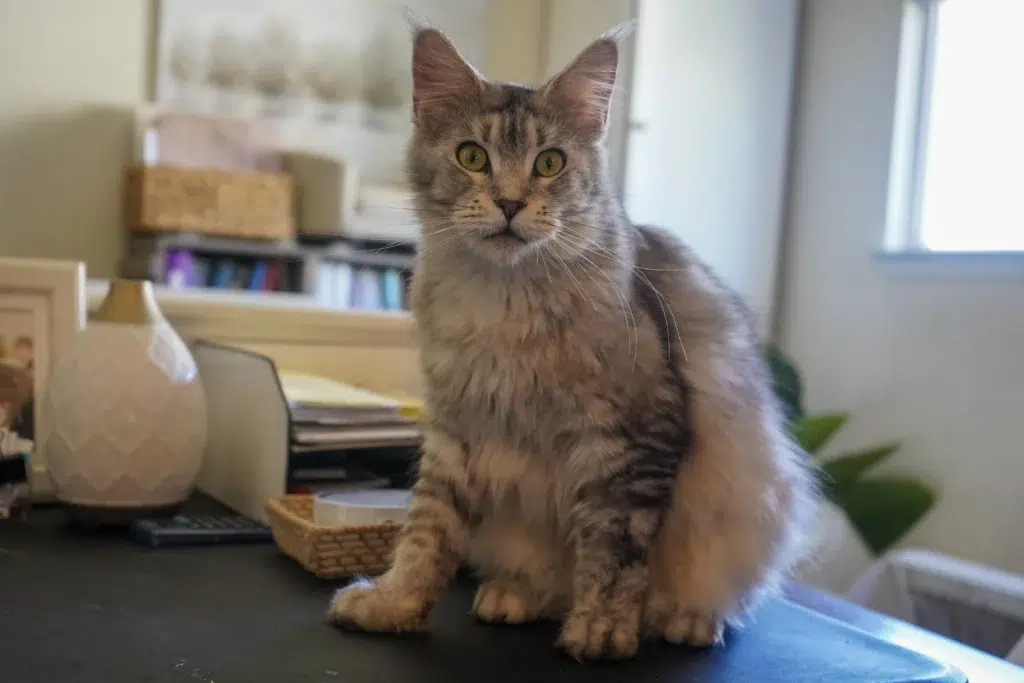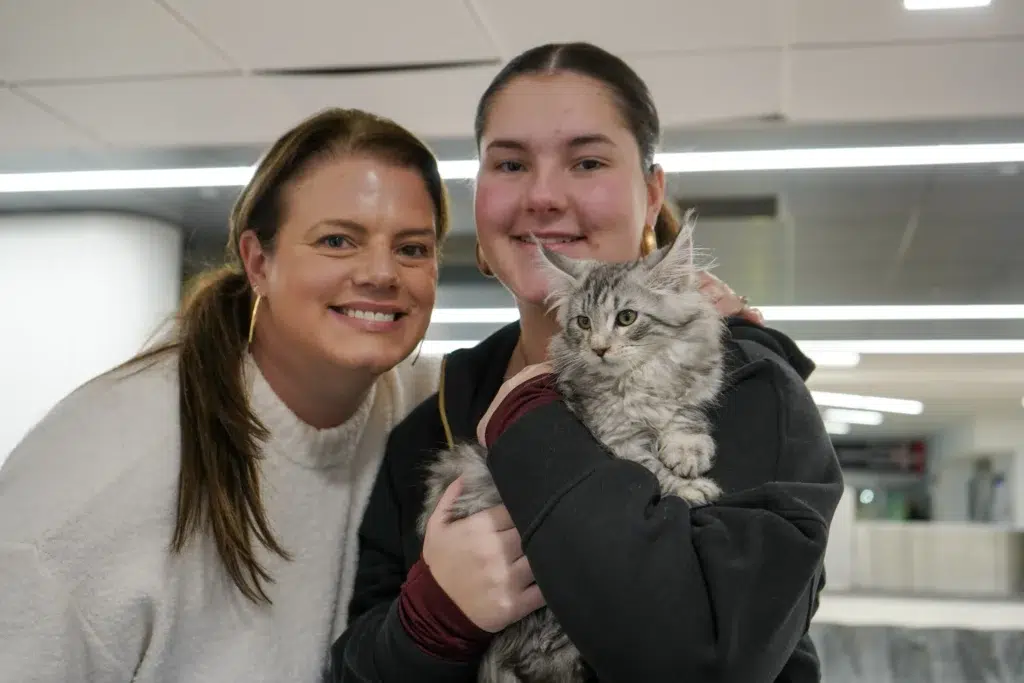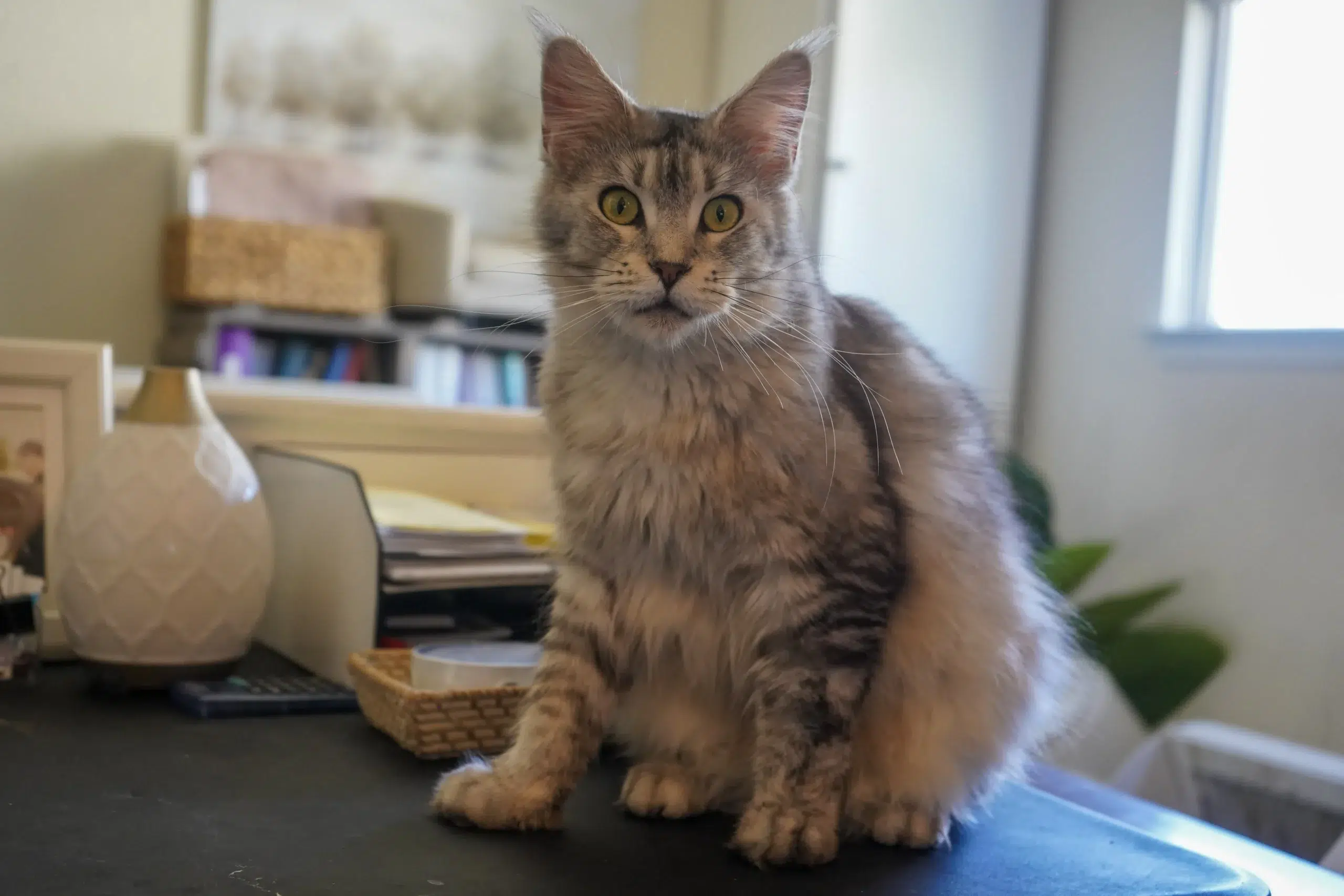
What to Expect When Adopting an Older Maine Coon
Adopting an adult Maine Coon brings the rewarding opportunity to welcome a gentle giant with a known personality into your home, offering calm companionship from day one. In this comprehensive guide to senior cat adoption, you’ll discover the benefits of choosing a retired or mature cat for adoption, understand typical temperament and health considerations, learn how the UK adoption process works, and master integration strategies for a seamless transition. We’ll also explore special care for senior Maine Coons and explain why Bellspurr’s retired breeding cats provide both affordability and emotional fulfilment for loving families.
What Are the Benefits of Adopting an Adult or Retired Maine Coon? (Older Cats for Adoption)
An established Maine Coon brings a predictable temperament and proven social skills, reducing the uncertainty that comes with a kitten’s rapidly developing behaviour. This reliability makes adopting old cats an appealing choice for first-time and experienced owners alike.
Advantages of Adopting Adult Cats
Studies and animal welfare organizations highlight several benefits of **adopting old cats** over kittens. These include having a known and established personality, generally calmer behavior, reduced need for constant supervision, and often being already litter-trained. **Mature cats for adoption** are also often a better fit for families with young children due to their more mellow nature.
This research reinforces the article’s points about the benefits of adopting an older cat or retired Maine Coon, particularly regarding their predictable temperament, settled nature, and ease of integration into a new home compared to kittens.
How Does an Established Personality Make Adoption Easier?
Adult Maine Coons exhibit clear tendencies—whether playful, laid-back or sociable—which helps adopters select a cat whose energy level matches their lifestyle. Knowing a cat’s preferences in advance prevents surprises and accelerates bonding.
Why Are Adult Maine Coons Calmer and More Settled Than Kittens?
With physical maturity comes decreased hyperactivity: adult Maine Coons typically rest more and play on their own terms, promoting a peaceful household. Their reduced need for constant supervision supports busy families or individuals seeking a balanced companion.
How Does Adopting a Retired Breeding Cat Provide Fulfillment?
Rescuing a retired breeder offers the emotional reward of giving a cat a second chance at a loving home. These cats often thrive with one-to-one attention after a structured breeding environment, deepening the bond between owner and pet. discover the joys of adopting a retired maine coon.
What Are the Cost Advantages of Adopting an Adult Maine Coon?
Adoption fees for mature Maine Coons are generally lower than purchase prices for kittens, making older cat for adoption more affordable upfront. Reduced initial training and vaccination costs also mean fewer unexpected expenses, supporting long-term care budgets.
What Is the Typical Temperament and Behaviour of an Adult Maine Coon?

Adult Maine Coons are celebrated for their gentle, dog-like loyalty and sociable nature, blending playful curiosity with affectionate calm. Drawing on insights from Bellspurr’s experienced feline behaviorists, understanding these traits helps ensure a harmonious bond and enriches both your life and your cat’s wellbeing.
What Personality Traits Are Common in Adult Maine Coons?
Many adult Maine Coons share three hallmark traits:
- Gentle affection that adapts to individual interaction styles
- High sociability, often greeting visitors and following owners room to room
- Intelligent playfulness, using toys or simple puzzles for engagement
These characteristics make them ideal companions for families, singles and seniors alike, and set the stage for predictable, long-term relationships.
How Do Adult Maine Coons Adapt to New Homes and Families?
Adult cats adjust through gradual introductions, with stress-reducing routines and safe havens accelerating comfort levels. Providing consistent feeding times, quiet resting areas and scent familiarisation helps a mature cat for adoption settle quickly.
What Are Effective Tips for Socialising Older Maine Coons?
To foster trust and confidence in an older cat, try these steps:
- Offer gentle, low-pressure play sessions with wand toys.
- Maintain a calm voice and avoid sudden movements.
- Use treats to reward exploratory behaviour in new spaces.
Introducing these practices nurtures confidence and strengthens your bond, preparing your cat for broader interactions.
How Does Adult Cat Behaviour Differ from Kitten Behaviour?
| Behaviour Aspect | Adult Maine Coon | Kitten |
|---|---|---|
| Energy Level | Moderate bursts followed by long rest | Frequent high-energy play throughout the day |
| Learning Curve | Established habits, minimal training needs | Requires extensive litter and behavioural training |
| Social Interaction | Sought-after affection on own terms | Demands constant attention and supervision |
Adults conserve energy for meaningful interaction, whereas kittens require more intensive engagement, skilling and supervision.
What Health Considerations Should You Know When Adopting an Older Maine Coon? (Elderly Cats for Adoption)
Adult and senior Maine Coons carry breed-specific risks that warrant proactive monitoring and tailored care. Early detection and preventative measures safeguard long-term health and quality of life. Bellspurr’s team of certified feline health specialists provides the following essential insights into Maine Coon health issues.
What Are Common Health Issues in Adult and Senior Maine Coons?
| Condition | Typical Signs | Preventative Action |
|---|---|---|
| Hypertrophic Cardiomyopathy | Laboured breathing, lethargy, murmurs | Annual cardiac ultrasound |
| Hip Dysplasia | Difficulty jumping, hind-leg stiffness | Weight management, joint supplements |
| Polycystic Kidney Disease | Increased thirst, frequent urination | Genetic screening, diet adjustments |
| Dental Disease | Bad breath, drooling, difficulty eating | Biannual dental check-ups |
Familial Hypertrophic Cardiomyopathy and Hip Dysplasia in Maine Coon Cats
Research indicates that Hypertrophic Cardiomyopathy (HCM) is a common heart disease in Maine Coons, often linked to a specific genetic mutation (A31P in MYBPC3) inherited in an autosomal dominant pattern, with affected cats developing severe disease in young adulthood. Additionally, studies on feline hip dysplasia (FHD) in Maine Coons show a prevalence of around 24.9%, with males having a slightly higher incidence, and the condition being hereditary and more severe in bilateral cases and with increasing age.
This research directly supports the article’s discussion on common health issues in adult and senior cat adoption, specifically Hypertrophic Cardiomyopathy and Hip Dysplasia, highlighting their genetic basis and prevalence.
How Can You Recognise Signs of Age-Related Conditions?
Stay attentive to subtle changes in mobility, appetite, coat condition and social engagement. Gradual weight loss or gain, reluctance to climb and altered grooming habits often herald underlying health issues that require veterinary assessment.
What Are the Recommended Veterinary Care and Preventative Measures?
Routine wellness schedules for older cats should include:
- Semi-annual physical examinations with blood panels
- Cardiac and renal screening from age five onwards
- Dental cleaning under anaesthetic every 12–18 months
Consistent monitoring reinforces healthy ageing and early intervention.
How Should Diet and Nutrition Change for Senior Maine Coons?
As metabolism slows, adult and senior Maine Coons benefit from:
- High-quality protein sources to maintain muscle mass
- Controlled phosphorus and sodium to support kidney function
- Increased fibre for digestive health
Tailoring meals to life stage promotes vitality and longevity.
What Grooming Routines Are Essential for Adult Maine Coons?
Thick double coats require brushing two to three times weekly to prevent matting and reduce hairball formation. Incorporate gentle deshedding tools and regular ear and nail checks to maintain overall hygiene and comfort.
How Does the Adoption Process Work for Adult Maine Coons in the UK? (Your Adoption Day Guide)
Adopting a mature Maine Coon in the UK involves several structured steps with rescue organisations and catteries to ensure a well-matched placement and the cat’s welfare. Maine Coon health issues can also be an important consideration when adopting.
Where Can You Find Reputable Maine Coon Rescue Organisations and Rehoming Centres?
In the UK, trusted resources include breed-specific rescues and national networks such as: are you ready to buy a maine coon kitten.
- Maine Coons in Need
- Regional RSPCA centres (**local shelter**, **adoption center**)
- Bellspurr’s retiree rehoming programme
These organisations prioritise health screening and temperament assessments to facilitate successful adoptions, including for older cats for adoption near me. Some also offer foster care options for cats awaiting their forever homes.
What Are the Typical Steps in the Adoption Application and Interview?
Prospective adopters usually follow this sequence: adopting a maine coon
- Complete a detailed application form outlining home environment and experience.
- Schedule a video or phone interview to discuss cat care and expectations.
- Provide references for home suitability and veterinary history.
This vetting ensures owners can meet the cat’s long-term needs, preparing them for their adoption day.
What Should You Expect During Home Visits and Assessments?
A home visit evaluates safety, space and enrichment provisions. Inspectors look for secure windows, accessible litter trays and appropriate resting spots, confirming the environment supports a calm transition. For more tips, check out tips to help your new maine coon settle into your home.
How Much Do Adoption Fees Usually Cost and What Do They Cover?
Adoption fees for adult Maine Coons in the UK generally range from £50 to £400, typically covering:
- Initial vaccinations and microchipping
- Basic blood tests and worming treatment
- Spay or neuter procedure
Transparent fee structures reflect genuine care expenses rather than profit.
What Important Questions Should You Ask Before Adopting?
Before committing, inquire about: things to consider before you buy a maine coon kitten
- The cat’s medical history and any ongoing treatments
- Behavioural quirks or known triggers
- Recommendations for dietary and environmental enrichment
Thorough due diligence cultivates confidence in your adoption decision.
How Can You Successfully Integrate an Adult Maine Coon into Your Home?
A thoughtful introduction protocol reduces stress and accelerates bonding, supporting smooth adaptation to new routines and companions. Bellspurr’s feline behavior specialists recommend the following strategies for successful integration.
What Are the Best Practices for Introducing an Adult Maine Coon to Other Pets?
Introduce on neutral ground, allowing scent exchange through bedding before face-to-face encounters. Supervised sessions with barriers or baby gates permit controlled, positive associations that build mutual tolerance and eventual friendship.
How Should You Introduce an Adult Maine Coon to Children?
Teach children calm interaction techniques—gentle petting and quiet play—while supervising all visits. Establish clear rules around handling and personal space to foster respect and prevent accidental stress.
How Do You Create a Safe and Stimulating Environment for Your New Cat?
Provide vertical perches, scratching posts and interactive toys to promote exercise and mental enrichment. Quiet hideaways and soft bedding afford the cat a sense of security while acclimatising to new surroundings.
What Are Common Adjustment Challenges and How Can You Manage Them?
Some mature cats exhibit hiding, lowered appetite or vocalisation during change. Counter these behaviours with routine feeding times, pheromone diffusers and patient, low-key interactions until the cat regains confidence.
What Are the Unique Needs and Care Tips for Senior Maine Coons? (Senior Cat Adoption)
Senior Maine Coons require refined care strategies to support aging joints, cognition and overall comfort, ensuring a graceful later life stage. Bellspurr’s feline health experts offer these specialized care tips for senior cats.
How Does Senior Maine Coon Care Differ from Adult Cat Care?
While adult maintenance focuses on energy balance and grooming, senior care emphasises joint support, gentle exercise and enhanced medical monitoring to address age-related vulnerabilities.
What Dietary Recommendations Support Healthy Ageing?
Senior-formulated diets should: traveling comfortably
- Deliver balanced omega-3 fatty acids for anti-inflammatory support
- Offer joint supplements such as glucosamine and chondroitin
- Include antioxidant blends to counter oxidative stress
These nutrients bolster mobility and organ health.
How Can You Support Joint Health and Mobility in Older Cats?
Regular, gentle play sessions maintain flexibility, while weight management reduces load on joints. Vet-approved joint supplements and controlled activity routines help preserve an active lifestyle.
What Are Signs of Cognitive or Emotional Changes in Senior Maine Coons?
Watch for disorientation, altered sleep patterns or reduced social interest—indicators of cognitive decline. Engaging puzzle feeders and predictable daily rituals can slow progression and enhance mental stimulation.
Why Choose a Retired Breeding Maine Coon for Adoption?
Retired breeders from Bellspurr bring demonstrated temperament and training, offering families a calm, affectionate companion while supporting the cat’s welfare after a career in the breeding programme.
What Temperament Traits Are Established in Retired Breeders?
Retired breeding Maine Coons typically display: adopting a Maine Coons
- Predictable calmness around strangers and other pets
- Consistent litter-tray habits and grooming tolerance
- Confidence in routine veterinary and handling procedures
These traits streamline daily care and build trust quickly.
How Does Adopting a Retired Breeder Benefit the Cat’s Wellbeing?
Transitioning a retired cat into a permanent home reduces long-term stress and provides the emotional security of stable family life. This second chance enhances the cat’s happiness and health outcomes, especially for older cats for adoption.
What Should You Expect in Terms of Training and Behaviour?
Retired breeders often require minimal behavioural training, as they are accustomed to cattery routines and human interaction. This reduces the time spent on litter training and basic commands, allowing you to focus on enrichment.
How Can You Support a Retired Breeder’s Transition to a New Home?
Offer quiet spaces, maintain consistent feeding schedules and continue familiar handling techniques used at the cattery. Gradual exposure to home life and gentle reassurance encourage a smooth emotional adjustment.
Adopting an adult Maine Coon brings a blend of known temperament, manageable care routines and heartening fulfilment, especially when choosing a retired breeder from Bellspurr. By understanding personality traits, health needs and integration strategies, you can provide a forever home that enriches both your life and that of your new feline companion. Consider senior cat adoption or **adopting old cats** for a truly rewarding experience.

